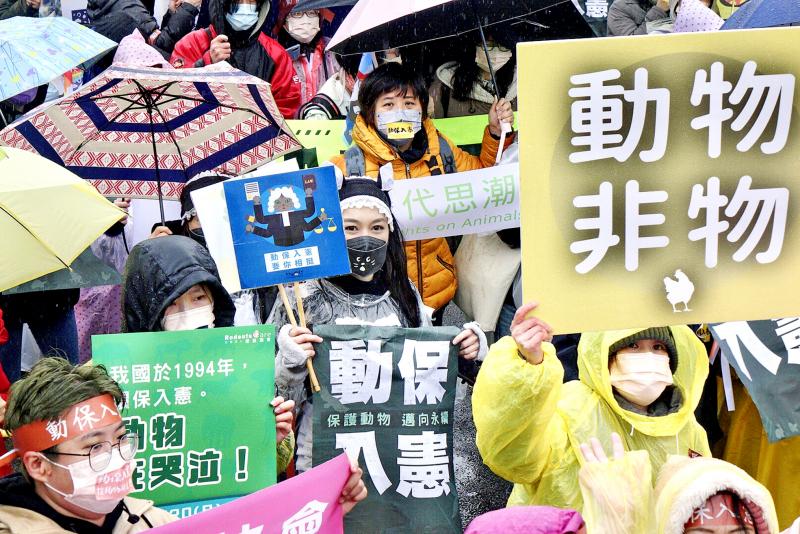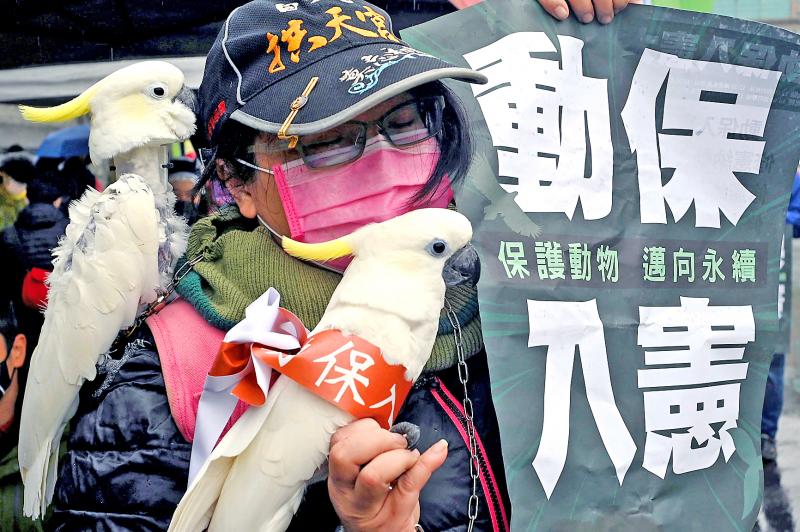Animal rights advocates and legislators yesterday braved the rain and cold in Taipei to march for the inclusion of animal rights in the Constitution.
Nearly 100 people — some with pets in tow — attended the march, which set out from the Presidential Office Building for the Legislative Yuan at about 2pm.
Organized by the Animal Protection Legislation Movement Alliance, a coalition of eight animal rights groups, the demonstration was held to urge the government to draft an amendment enshrining legal protections for animals into the Constitution.

Photo: Peter Lo, Taipei Times
Taiwan People’s Party Secretary-General Hsieh Li-kung (謝立功) praised the attendees for braving the cold, showing the force of will that would propel the movement forward.
Animals are not objects, but should be loved and cared for like children, Hsieh said, adding that treating animals well is indicative of a progressive nation.
Taiwan’s laws are severely outdated, Chinese Nationalist Party (KMT) Legislator Sandy Yeh (葉毓蘭) told the gathering.

Photo: Sam Yeh, AFP
There are more than 250,000 cases of animal cruelty every year, but only the Animal Protection Division of the Council of Agriculture’s Department of Animal Husbandry is equipped to respond, she said.
Dogs, cats and other animals are all important members of the family, she said, adding that it is important to enact laws protecting them and requiring their owners to take responsibility for them.
People are animals, just like dogs and cats, New Power Party (NPP) Chairperson Chen Jiau-hua (陳椒華) said.
Animal protections are a universal right and enshrining it in the Constitution would foster this sentiment, she added.
About a week before the rally, President Tsai Ing-wen (蔡英文) told the Democratic Progressive Party (DPP) Central Standing Committee that she supports the advocates’ position, DPP Taipei City Councilor Hsu Shu-hua (許淑華) said.
The committee agreed, saying that the most immediate task would be amending the Animal Protection Act (動物保護法) to make repeat animal abusers criminally liable and treat animals as living beings instead of property, Hsu said.
The party has also proposed a special civil law and a special criminal law dealing with animal protections, as it would be faster than amending the Constitution, she added.
Italy on Feb. 9 became the 10th country to guarantee animals full rights under its constitution, Taiwan Animal Protection Monitor Network secretary-general Ho Tsung-hsun (何宗勳) said.
The network plans to make its case to the KMT caucus tomorrow at 10am, then to the TPP caucus on Wednesday at 4:30pm, Ho said.
Meetings have not yet been scheduled with the DPP or the NPP, he added.

Taiwan has received more than US$70 million in royalties as of the end of last year from developing the F-16V jet as countries worldwide purchase or upgrade to this popular model, government and military officials said on Saturday. Taiwan funded the development of the F-16V jet and ended up the sole investor as other countries withdrew from the program. Now the F-16V is increasingly popular and countries must pay Taiwan a percentage in royalties when they purchase new F-16V aircraft or upgrade older F-16 models. The next five years are expected to be the peak for these royalties, with Taiwan potentially earning

STAY IN YOUR LANE: As the US and Israel attack Iran, the ministry has warned China not to overstep by including Taiwanese citizens in its evacuation orders The Ministry of Foreign Affairs (MOFA) yesterday rebuked a statement by China’s embassy in Israel that it would evacuate Taiwanese holders of Chinese travel documents from Israel amid the latter’s escalating conflict with Iran. Tensions have risen across the Middle East in the wake of US and Israeli airstrikes on Iran beginning Saturday. China subsequently issued an evacuation notice for its citizens. In a news release, the Chinese embassy in Israel said holders of “Taiwan compatriot permits (台胞證)” issued to Taiwanese nationals by Chinese authorities for travel to China — could register for evacuation to Egypt. In Taipei, the ministry yesterday said Taiwan

Taiwan is awaiting official notification from the US regarding the status of the Agreement on Reciprocal Trade (ART) after the US Supreme Court ruled US President Donald Trump's global tariffs unconstitutional. Speaking to reporters before a legislative hearing today, Premier Cho Jung-tai (卓榮泰) said that Taiwan's negotiation team remains focused on ensuring that the bilateral trade deal remains intact despite the legal challenge to Trump's tariff policy. "The US has pledged to notify its trade partners once the subsequent administrative and legal processes are finalized, and that certainly includes Taiwan," Cho said when asked about opposition parties’ doubts that the ART was

If China chose to invade Taiwan tomorrow, it would only have to sever three undersea fiber-optic cable clusters to cause a data blackout, Jason Hsu (許毓仁), a senior fellow at the Hudson Institute and former Chinese Nationalist Party (KMT) legislator, told a US security panel yesterday. In a Taiwan contingency, cable disruption would be one of the earliest preinvasion actions and the signal that escalation had begun, he said, adding that Taiwan’s current cable repair capabilities are insufficient. The US-China Economic and Security Review Commission (USCC) yesterday held a hearing on US-China Competition Under the Sea, with Hsu speaking on